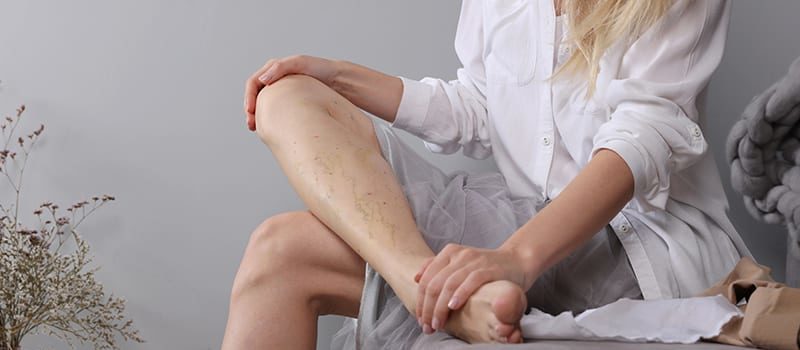5 Ways to Care for Varicose Veins in Winter

What are Varicose Veins?
Varicose veins are twisted, enlarged veins that appear just under the skin’s surface. They commonly affect the legs because veins must work against gravity to return blood back up to your heart. Also, standing and walking increase pressure in the leg veins.
Valves in your veins open to allow blood flow back to the heart. The valves then close to stop blood from traveling back the wrong way. In some people, these valves are damaged or weak, allowing the blood to flow backward and pool in the veins. The collection of blood causes the veins to stretch and twist and become distorted.
In some people, varicose veins do not cause symptoms and are only a cosmetic issue. However, many people suffer uncomfortable symptoms of varicose veins, such as pain, aching, burning, itching, skin discoloration, ulceration and more. Winter can worsen some of these symptoms, but they can be easily prevented with a little extra self-care at home.
Can They Be Treated at Home?
Varicose veins cannot be cured with home treatments; however, there are self-care measures that help manage symptoms, easing pain and preventing the condition from getting worse.
The gold standard home approach is wearing compression stockings, which work by squeezing the legs to help veins move blood back up toward the heart instead of pooling in the leg veins. Compression stockings should be worn all day, but taken off before you go to bed. Because your legs are at heart level while sleeping, the blood can return to the heart normally and the socks are not needed.
Most pharmacies, big box and grocery stores with pharmacy sections and medical supply companies often carry a variety of compression stockings. In the past, black and tan were the extent of your choices, but with online retailers like Amazon, you can now purchase compression stockings in a stylish to fun and funky variety of prints. Depending on the severity of your varicose veins, your doctor may suggest a specific compression level or prescription-strength stockings.* If prescribed, the stockings are likely covered by insurance. However, the cost of compression socks is extremely low even out-of-pocket.
Other self-care measures for helping varicose veins include:
- Exercising (wear your compression socks)
- Losing excess weight
- Avoiding tight clothing
- Elevating your legs
- Avoiding long periods of standing or sitting
How Does Cold Weather Affect Varicose Veins?
Although cold weather can help constrict your veins and blood vessels, making varicose veins less visible, other factors affect your varicose veins during the winter months:
- Cold weather tends to keep people inside more, which leads to more sedentary behavior (long periods of inactivity) and can make varicose veins worse.
- Atmospheric pressure fluctuates, which can cause poor blood circulation and a “heavier” feeling in your legs, making unpleasant symptoms more intense.
- Dry air can dry out skin, which may cause painful ulcerations (open wounds) to form over your varicose veins.
How to Care for Varicose Veins in Winter Months
Be sure to follow all the normal self-care recommendations above. During winter, taking care of your varicose veins doesn’t require much more, but there are some tips to help with bothersome winter symptoms, like dry and ulcerating skin.
- Dress appropriately for the weather when going outdoors, especially if the temperature is below freezing.
- Regularly use a moisturizer to relieve dry skin on legs, ankles and feet.
- Pay closer attention to the appearance of your legs during the winter and note any changes to discuss with your doctor.
- Drink plenty of water, eat nutritious meals and snacks and avoid extra sodium.
- Exercise every day, even if you have to break it up into 10 minute chunks. Take a 10-minute walk around the house or up and down the stairs.
Varicose veins can have a significant impact on your health, lifestyle and wellbeing. Please contact us today to schedule your free consultation. The Vein Institute of Hunterdon is conveniently located in Clinton, NJ near Hunterdon, Morris, and Somerset Counties.
*For your convenience, we carry a selection of compression stockings for varicose veins. Your TVI doctor can direct you to the appropriate socks for your condition.
